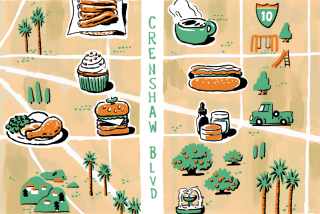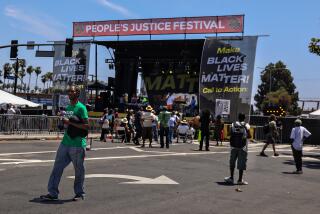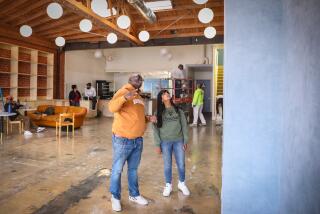Todayâs young protesters see injustice through a different filter
Najee Ali is an old hand at activism. Jesse Jackson was his mentor; heâs Al Sharptonâs protege. So Ali thought he had everything in place for a peaceful protest of the verdict in the Trayvon Martin case this week.
But somewhere between the opening prayer and Walmart being trashed, something went terribly wrong with Monday nightâs Crenshaw-area rally.
While a few hundred folks were gathered at Leimert Park, praying, singing and venting, dozens of unruly young people began commandeering the streets. Many were captured on camera breaking store windows, assaulting strangers and vandalizing cars along Crenshaw Boulevard.
At least 14 people â most of them teenagers â were arrested that night by the Los Angeles Police Department.
That violence, of course, is what captured our attention, eclipsing the peaceful vigil and giving the South Los Angeles protest a very public black eye.
There was âanger, embarrassment and hurtâ among the crowd in Leimert Park, Ali recounted. âIt hurt that our young people had let us down, because they donât realize that a few teenagersâ actions can damage all the work weâve done trying to uplift Trayvon Martin.â
But itâs not as simple as thugs gone wild.
Certainly there were more than a few hoodlums in that crowd. But there were also aimless young people, not violent, just antsy and confused.
âOf the hundred people I saw heading down Crenshaw, maybe 20 of them had the intent to make trouble,â said Marqueece Harris-Dawson, who heads the Community Coalition, which brought about 50 teenagers to the rally. He had to talk some of them into sticking around.
âItâs crazy, because all of a sudden from every direction, kids are running to a certain spot, and you canât tell where that spot is or why theyâre doing it, because youâre not on that Twitter page,â he said. âTheyâre just running up and down Crenshaw.
âYou stop and ask them what theyâre doing, and they didnât know. It was âWe just did not want to stand in this park, listening to people talk. Weâre way past speeches. That doesnât cut it for me.â
âThis is not your grandmotherâs civil rights movement ⌠walking slowly, carrying signs,â Harris-Dawson said. âThey donât do things the way we do. And we donât know how to organize or control it.â
::
The Florida juryâs acquittal of George Zimmerman is sparking protests across the nation. Most are orderly and lawful, but in California, police had to quell violence along Crenshaw, in Oakland and at two protests in San Bernardino County this week.
Some of that violence has been sparked by fringe groups, âoutside agitatorsâ in the parlance of community residents and police.
In Oakland, masked protesters roamed the streets, breaking windows and bashing cars. Locals tried to intervene. Police suspect it was the same band of âanarchistsâ who disrupted peaceful protests two years ago after the trial of the BART cop who shot Oscar Grant. Of the nine people arrested Monday night, six were from outside of Oakland.
At the Leimert Park protest, a small band of radicals from the Revolutionary Communist Party âshowed up with the explicit intent of having a confrontation with the police,â Harris-Dawson said. âA white kid would run up and get in a copâs face and start yelling, and a member of our community would pick them up and carry them away.â
Crenshaw High junior Timothy Walker witnessed the same thing. The communists âwere on, like, a whole different agenda.â They didnât start the violence, he said, âbut they fed into what people were feeling, got them riled up a little bit more.â
Timothy, 16, has been working with the coalition to help organize his peers to work for change constructively. Thereâs a lot of untapped potential in neighborhoods like his, but adults donât seem to be listening.
âItâs not that we donât care about the issues,â he said. âWhen I first heard the verdict and checked my social networks, not one post I saw wasnât about Trayvon Martin. We just donât have a place to show how we feel.
âWe see the adults talking for us, and we donât really get a chance to be at the forefront. Then when we do get a chance, it comes out kind of violent, like we saw on Monday night.â
::
The civil rights establishment is going to have to change its tactics and its focus to get this younger generation on board.
âEverybody who was born after the riots, weâve never really been through this,â Timothy pointed out. âBefore Trayvon Martin, we didnât have that kind of feeling of injustice.
âAnd itâs hard to think about what to do if weâre mad or frustrated. So you just disengage, because you think thereâs nothing we can do to change things.â
The aim of the Leimert Park protest was to push for federal prosecution of Zimmerman and changes in âstand your groundâ laws.
But Harris-Dawson, whoâs worked with hundreds of youths in the coalitionâs education and community programs, said thatâs not the young peopleâs agenda. Their civil rights battle is different from ours.
âWeâve been successful in beating back blatant racism,â said Harris-Dawson, who is 42. âWhat theyâre dealing with is much more complicated and harder to get your arms around.â
They donât see the Trayvon Martin case as a product of centuries of racial injustice or a cry for policy changes.
âThey see it more as a popular culture issue ⌠about fashion and guns and being profiled because youâre young.â
This case felt personal to them because it mirrors what they feel on the streets â judged because of the way they dress, worried that the guy next to them has a gun.
âThey related it to the hoodie, where generations before them would have emphasized the racial aspects,â Harris-Dawson said.
Theyâre more concerned with getting guns off the streets than putting Zimmerman on trial again. And they donât need to gather in Leimert Park, when theyâve got hundreds of like-minded friends as near as the apps on their cellphones.
More to Read
Sign up for Essential California
The most important California stories and recommendations in your inbox every morning.
You may occasionally receive promotional content from the Los Angeles Times.











